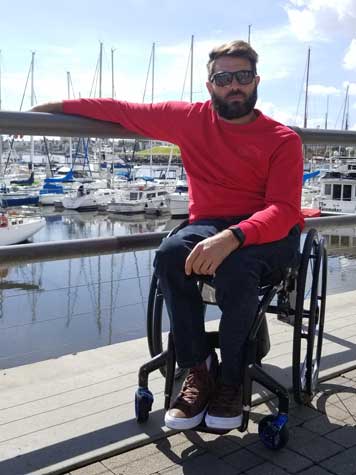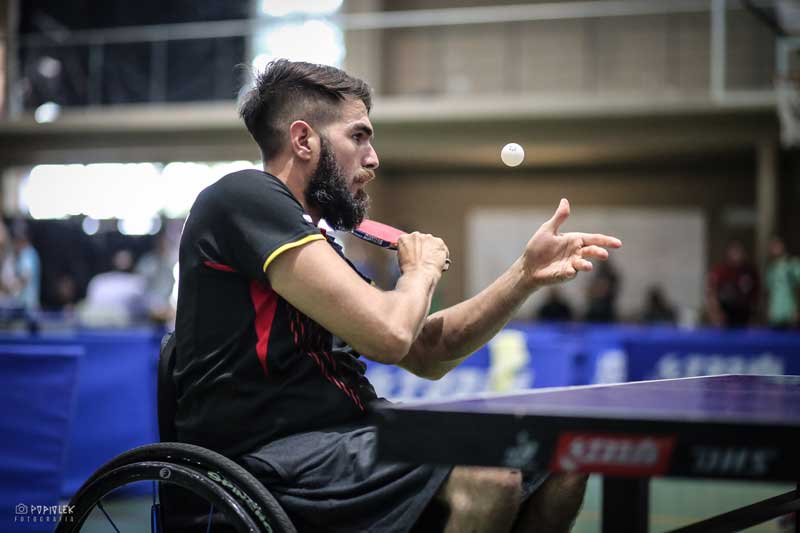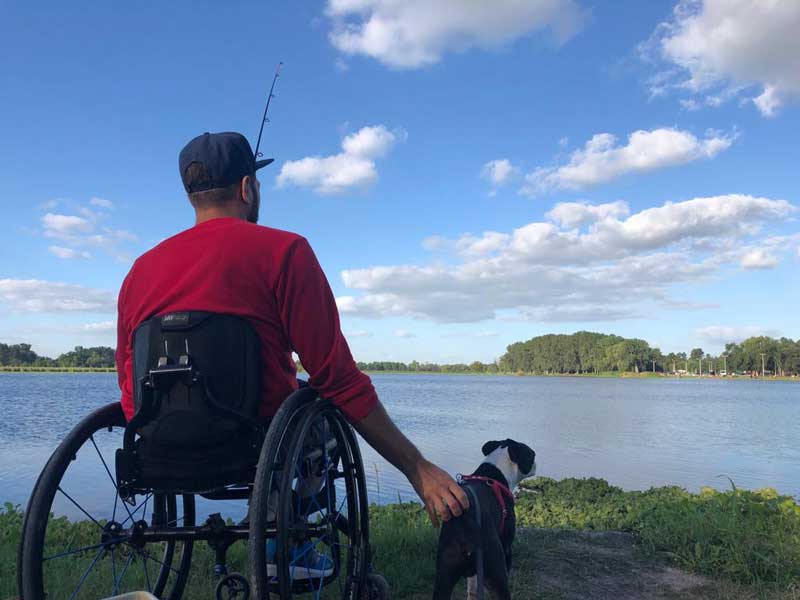Name: Gabriel C.
Age: 35 years old
Location: Buenos Aires, Argentina
Fun Facts
Gabriel lives in Buenos Aires, Argentina where he works as a Physical Educator. In addition, he is a Paralympic athlete in the sport of table tennis. He participated in the London 2012 and Rio 2016 Games. Currently, Gabriel is ranked 10th in the world for his class (class 3). He loves spending his free time with his girlfriend, family, and friends. According to Gabriel, grilling, eating pizza, and watching soccer games are the perfect excuses to spend time together. He also participates in a radio program for one of the most popular stations in the country. The program is called "Traveling on Wheels." In this space, he has the opportunity to share with the listeners the stories of people with disabilities, who, like him, live a full life and see physical disability as one more component in their lives.

Mobility History
In 1995, when Gabriel was 11 years old, he sustained a complete spinal cord injury (SCI) at the T3-T4 level as the result of a bicycle accident. Three years post-injury, his doctor recommended a spinal fusion to correct a developing scoliosis. Unfortunately, less than a month later they had to remove the rods because his body rejected the material.
Gabriel continued his studies with his peers and found a passion in playing table tennis. He started playing in local tournaments and within a short period of time he was playing internationally. During those years, the scoliosis increased drastically and in 2004 he decided to try another spinal fusion. This time, the procedure was a success and his position improved considerably. A couple of years later, Gabriel noticed a deviation in his back. X-rays confirmed a broken rod. Gabriel decided he would not undergo surgery.
Since his injury in 1995, Gabriel has not had good experiences with wheelchairs and mobility equipment in general. He reported that his first couple of wheelchairs were made of steel and were heavy and difficult to maneuver, making it very difficult for him to keep up with the lifestyle he led. After years of using these chairs, he decided to invest in an ultra lightweight wheelchair. Unfortunately, the supplier who sold him the wheelchair did not conduct a thorough evaluation of Gabriel or consult with him on all of the pieces of equipment ordered on the wheelchair. Due to the inappropriate configuration of the wheelchair, Gabriel reported that he fell out of the chair several times in the following months. He became increasingly frustrated and stressed about not having a wheelchair that met his needs.
His experience with positioning systems was also challenging. He spent years trying out bad quality cushions without contour, with inserts that would get damaged in weeks and stiff covers not friendly to his skin. One day, someone recommended to try a cushion with adjustable air cells. After a few months of using an air cell cushion, Gabriel was content that he had not developed skin injuries. However, he struggled with stability and stated his posture was not optimal.
Reasons for Seeking New Equipment
Tired of frames and positioning systems that did nothing to help his posture and independence, Gabriel began talking with other athletes who had similar disabilities and diagnoses. He started noticing how some features improved posture and performance. As he was traveling around the world meeting athletes in wheelchairs, he began to educate himself and to better understand the importance of a proper configuration. The problem at that point was that he did not know where to go in his country to get evaluated for, much less obtain, the type of seating and wheeled mobility equipment he needed.

In 2016, while preparing for the Rio Paralympic Games, he was contacted by the local Sunrise Medical distributor for Latin America and was offered to be the brand's ambassador in his country. For the first time, Gabriel had the opportunity to receive a formal postural evaluation conducted by an interdisciplinary team. Gabriel's team agreed that the best option for him was a rigid ultra lightweight wheelchair. The Quickie 7R was the frame chosen for its weight, but also for having the option of a Freestyle® back. This system not only makes the chair lighter, but also allows the trunk and upper extremities to move freely in a 360° range of motion, which is very important for Gabriel when playing table tennis.
When choosing the cushion, Gabriel was skeptical regarding changing the air cushion that had protected his skin for years, but he also knew he needed to improve his stability. Listening to the advantages that a cushion with a foam base may provide him, including more stability and greater lateral support, he decided to explore other options. A JAY Fusion® with a fluid insert was the final decision. The possibility of changing the fluid insert to an air insert in the future if he deems it necessary gave him even more confidence to make the change.
Current Status
Gabriel reports with great enthusiasm that his seating system and wheelchair that was designed specifically for his needs has brought him countless benefits to his overall independence and physical health. Until Gabriel began the process for ordering a wheelchair that would be built specifically for him, he did not realize the impact each component and the setup of the wheelchair had. For example, due to Gabriel's functional abilities and experience level, he does not need upper extremity supports or an anti-tip system. Eliminating both of these options from his wheelchair has decreased the overall weight of the system, increased his access to the rear wheels, and improved the maneuverability of the wheelchair.
Gabriel has also gained an increased understanding of the impact a properly configured back support can have on not only participating in the everyday mobility-related activities of daily living, but also on his favorite leisure activities including table tennis. Historically, Gabriel always selected a lower back rest because he wanted to have the complete freedom to move his upper extremities and trunk quickly in order to play table tennis well. Today, he understands that a higher and/or deeper back support can actually help improve his posture and give him greater stability in his daily activities away from the sport. The design of the Freestyle® back allows him the freedom of movement he required for playing table tennis.

For Gabriel, his keys to successfully obtaining the optimal seating system and wheelchair to meet his clinical and functional needs include: working with a team of knowledgeable complex rehabilitation technology (CRT) professionals, having an open mind to try new technologies, making changes when appropriate, and serving as his own advocate by speaking up about what he truly needs.